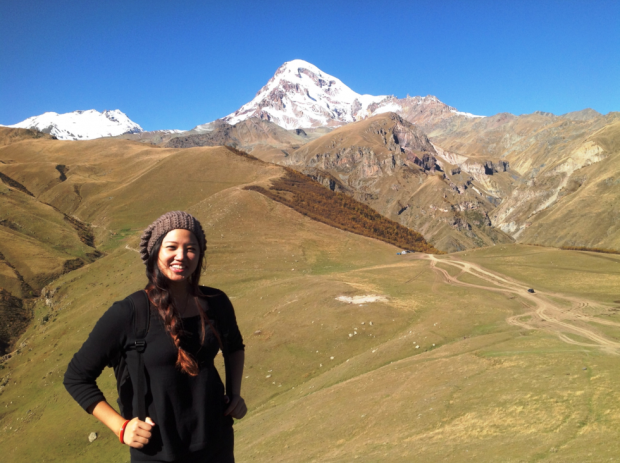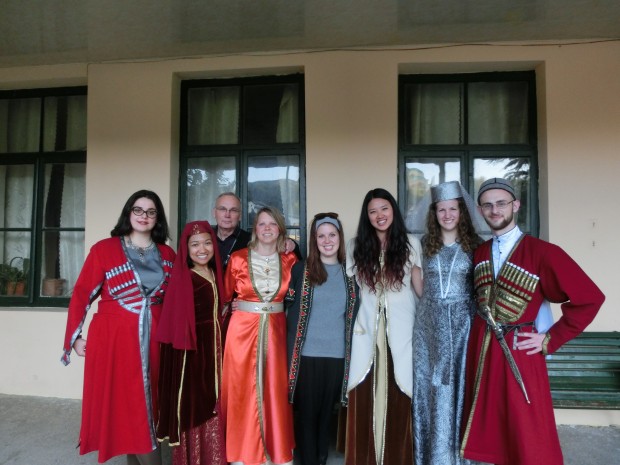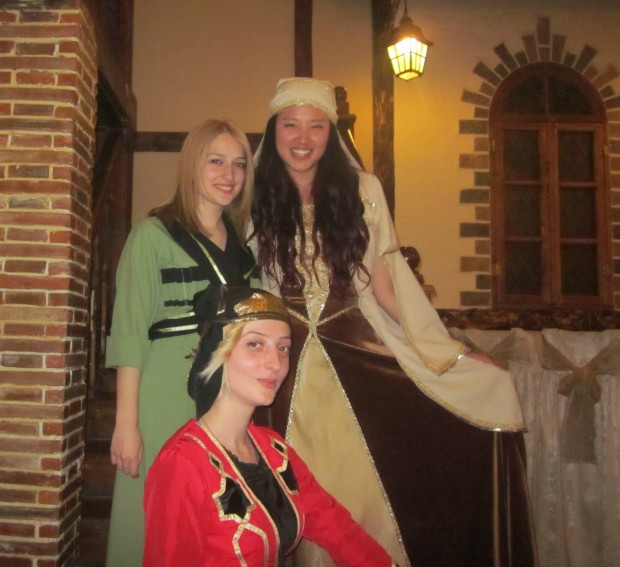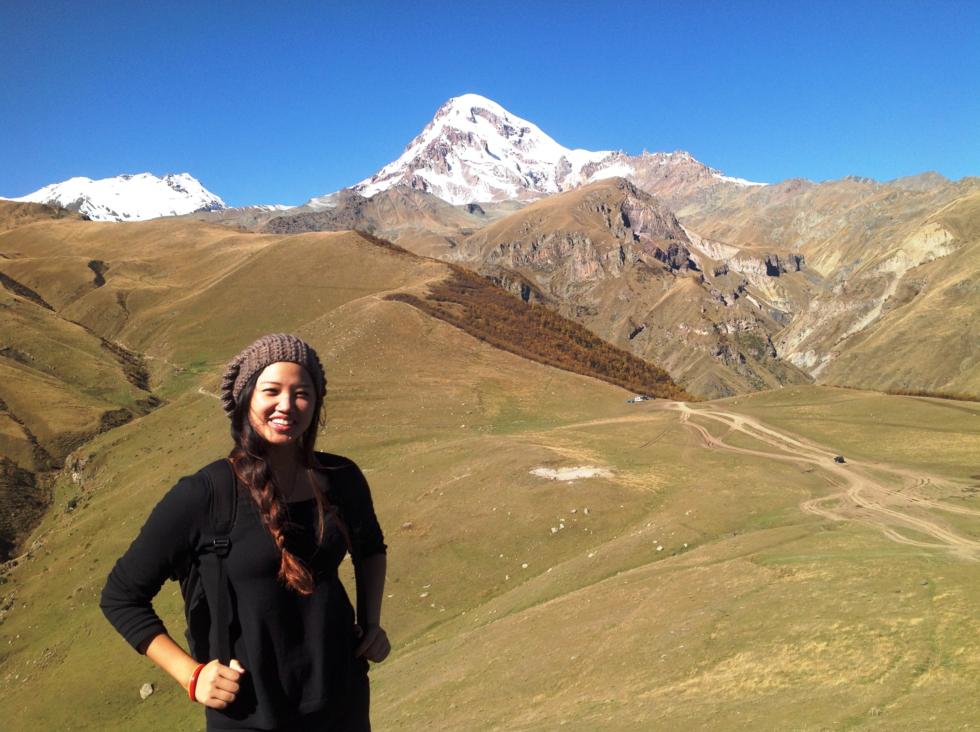
“There are similarities between Georgians and Koreans”
We had an interview with Ann Yang who is an international development practitioner. She is currently getting her Master of Arts degree in Washington, DC on International Development Studies, while also working at an NGO that promotes private sector growth in developing countries. Ann lived in Kutaisi, Georgia for 2 years as an English Education and Youth Development volunteer.
Dear Ann, first of all, why did you come to Georgia? What are your activities within the Peace Corps in Georgia?
Having a background of living in various countries, I am interested in exploring different cultures and learning new languages. After graduating from college, I decided to apply for the Peace Corps. Peace Corps is a US-based volunteering agency, which requires a 2-year minimum of commitment in a country where volunteers are needed. This government agency provides a comprehensive three-month training about the country’s language and culture. I decided that Peace Corps would be a good experience before I continued with my graduate-level education. I applied in July 2012 and six months later I was informed that I was accepted for a position in Georgia as an English Education and Youth Development Volunteer. I flew in April 2013 to Georgia along with 29 other fellow Peace Corps volunteers. After three months of training, we were sent to our assigned sites to serve for 2 years and that is how I ended up in Kutaisi, a town which I grew to love.
What was your expectation of Georgia before your arrival?
The first time I ever heard about Georgia was regarding the conflict with Russia which happened in 2008. I remember watching the Beijing Olympics when there was the breaking news about Russia and Georgia’s conflict with South Ossetia. It was unfortunate that the first thing I heard about Georgia was such tragic news with Russia. When I heard that I was assigned to a position in Georgia, I had to look up the country to learn more about it. I got all excited when I read about the unique culture of Georgia with the traditional dancing, wine-making, and the beautiful Caucasus Mountains.
What was your first impression? How has it changed?
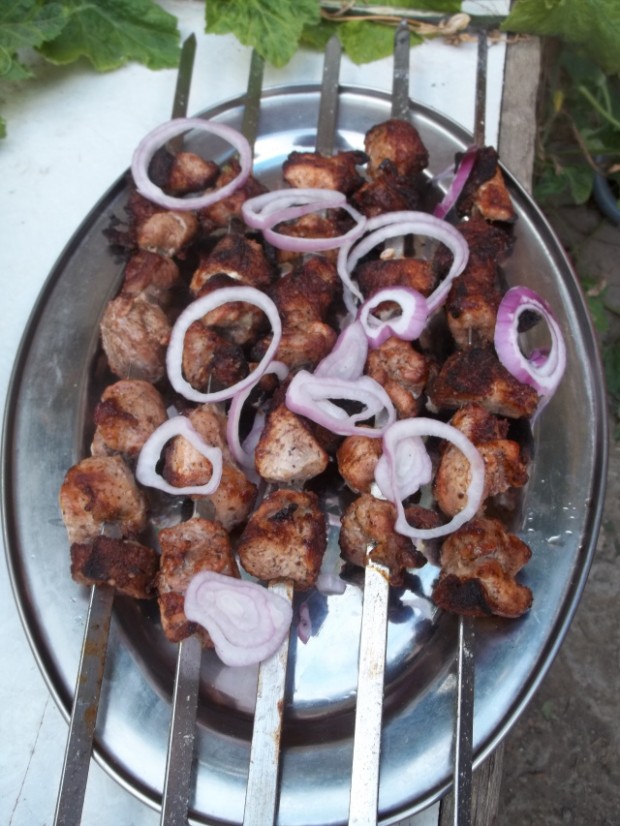
I remember having Georgian food for the first time after getting off the plane. I didn’t know what I was eating then but I recall it being eggplant with walnut sauce, cheese bread, and pork BBQ. I enjoyed everything I was eating and instantly knew that I will like my stay in Georgia. Though it was when I met with my first host family that made everything much more interesting.
It was Georgian Orthodox Easter holiday when we first arrived in Georgia. There were feasts with relatives and neighbors every day for several days and we were taught to greet Georgians with “Christ has risen”. At the time, with our limited language skills, it was really hard to say “kriste agsdga”. However, since every time I say the phrase to greet others, I was rewarded with a friendly smile and a greet back saying “cheshmaritad (Indeed)” from the Georgians that I was compelled to greet everyone with the phrase. There were no strangers or enemies on this day. Everyone knew how to greet each other and they all got a friendly response.
Can you talk about your experiences with the Peace Corps in Georgia?
There were unlimited opportunities that were provided due to the strong interest of learning English among the young generation in Georgia. I worked at a school in Kutaisi that had a majority of internally displaced peoples’ children. The children were not in the best living conditions but they were bright and eager to learn. After school hours, living in the second most-populated town in Georgia, I was given various opportunities to work at after-school English clubs or community projects.
For community projects, I implemented a Volunteer Fair and connected local NGOs with college students, organized a gender-based violence campaign with local NGOs and high school girls, spearheaded a food drive with the help of the Kutaisi City Hall to provide food to people in need, and started a Model United Nations where students learned about international issues and had a debate with fellow students in English. Thanks to the enthusiasm of the students, local NGOs, and the Kutaisi City Hall, I was able to organize various events for the students in Kutaisi. During the summer, I was also kept busy with English camps, healthy lifestyle camps, and village school camps.
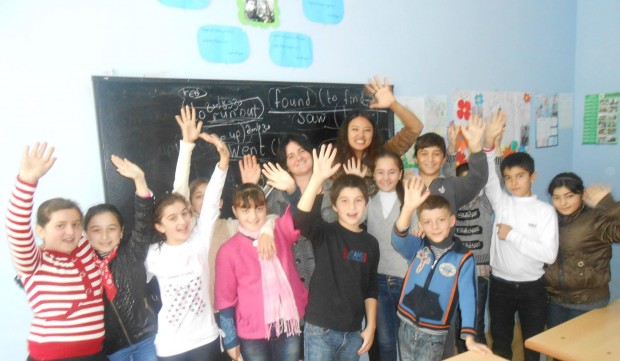
I think your experience living together with a Georgian Family is very interesting. How was it?
I am glad that as a Peace Corps volunteer, I had the opportunity to live with the host family. I do believe that in order to fully immerse in a culture, you have to live with a host family. In Georgia, households make their own wine and compotes during the fall that will last a year. I had the experience of helping my host family to wash and cut fruits and to pick the grapes from the vineyard for this prepping process.
Another interesting experience I had with my host families is the way they spend the holidays. Usually, during holidays our host family will have a feast for the neighbors or relatives. The best wines come out with stacks of foods on a long table. People share food for hours and there is always a dancing session in the end. Age, gender, or social status, all don’t matter with Georgians when it comes to dancing. Every festival ends with a fun dancing party.
What was the new and fascinating thing for you?
There was a different concept of space and privacy from Georgians than I’m used to. Georgians seemed to be very family oriented and had less of privacy among the family members. It was interesting to see my host family always hanging out together in the living room without having much personal space. As a guest of the house, I was provided my own room. However, I had my host sister and brother popping in every time without knocking or asking, which first came to me as a shock. But later I realized that they were just recognizing me as a member of the family.
Can you cook some Georgian food? Which one is your favorite?
While I was in Georgia, I tried to cook khinkali, khachapuri, and lobiani. It was not easy to make these foods since I had a hard time making a good dough. I greatly enjoyed the ways Georgians cooked their beans and how their food incorporates walnut sauce in various dishes. The cold chicken dish with walnut sauce, eggplant with walnut sauce layers, and cucumber and tomato salad with walnut sauce were on the top of my list.
Do you have good friends there?
Kutaisi was a town that had universities and job opportunities, which meant that there were a lot of young people. I have a friend Maka, who was working at an NGO named Georgian Young Lawyers Association. She was my key partner in implementing community projects and was a friend who introduced me to local friends, some of whom were artists, and all of whom were open-minded and deeply cared about their community.
As I know you traveled much inside Georgia, which place is your favorite one?
There were so many places that I loved so much. Khevsureti, Mestia, Kazbegi, and Vardzia were all amazing due to their unique scenic views but also the historical towers and churches. However, I must say that Tusheti was my favorite among them all. It truly showed the beauty of the Caucasus Mountains. My fellow Peace Corps friends and I enjoyed a three-night camping trip up on the mountains, the campsite to which took us a 4-hour jeep ride from the base of the mountain. At the top of the mountain, there were barely any people around but small remote villages where people lived in a traditional lifestyle. I was awestruck and breathless by both its sheer majesty and serenity.
Are there some similarities between Georgian and Korean Culture?
There were a few things about Georgian people and culture that reminded me of Koreans. I believe Koreans have temperaments that are similar to Georgians in that both are proud of their culture and heritage and are distinctively proud to be Korean or Georgian, respectively. I believe both being countries that were fearful of losing their identities and culture by their neighboring countries, they both were able to develop this deep love of their heritage and faith in their culture.
Koreans also have the temperament of being playfully quaint or fanciful and being passionate about various matters. They deeply care about their acquaintances and easily sympathize with other people. Koreans also love to sing, dance, and drink when there is a gathering. I have definitely seen these qualities in Georgians and was surprised by how many similarities existed.
Have you figured out that Georgians are interested in Asian Culture?
Asian culture is not as well known in Georgia. Free University was one of the few that taught Asian studies and language to the students in Georgia. I do believe that more cultural exchange between Georgia and various Asian countries will be good for both sides. I can see that increase of travel opportunities, the increase of trade of products, and more country-to-country organized cultural fairs would be beneficial.
Would you recommend your friends to visit Georgia?
Georgia has its unique culture and beautiful mountain sceneries that I can’t emphasize enough. Georgian food is also not well-known to most of the Asian countries, which is very unfortunate. It is worthwhile to just visit Georgia to try Georgian food and their wine. The Georgians are also very hospitable and love to host guests. It will be a valuable experience to meet the Georgians and to have the opportunity to share a supra (festive feast) with them. I miss Georgia tremendously and would want others to have the chance to get to know the country Georgia.
Thank you, dear Ann Yang.
This interview was done by Edita Badasyan (Tbilisi, Georgia).



